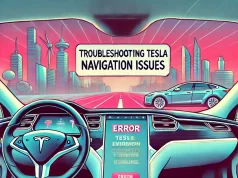Some Tesla owners have reported a frustrating issue with their Bluetooth audio: a noticeable delay or lag when playing videos or games on their phones or tablets.
The Bluetooth delay is not unique to Tesla, as it affects many other cars and devices that use Bluetooth technology.
However, it can be especially annoying for Tesla drivers who want to enjoy their premium sound system and large touchscreen display.
What Causes the Tesla Bluetooth Audio Delay?
The Bluetooth delay happens when there is a mismatch between the audio and video signals that are transmitted wirelessly from the source device (such as a phone or tablet) to the destination device (such as a car stereo or speaker).
The audio signal takes longer to process and travel than the video signal, resulting in a noticeable gap between what you see and what you hear.
The amount of delay depends on several factors, such as:
1. The Bluetooth version and codec are used by both devices. Newer versions of Bluetooth (such as 5.0) and codecs (such as aptX) are designed to reduce latency and improve sound quality, but not all devices support them.
2. The distance and interference between the devices. The farther apart the devices are, or the more obstacles (such as walls or other electronics) there are in between, the more likely the signal will degrade and cause delays.
3. The app or media player used to play the video or game. Some apps or media players have built-in features to compensate for the Bluetooth delay by adjusting the video playback speed or adding a buffer.
However, not all apps or media players support this feature, or they may not work well with certain devices or formats.
How to Fix the Tesla Bluetooth Audio Delay?
There are a few possible solutions to fix the Bluetooth delay issue in Tesla vehicles, depending on the situation and preference of the user. Here are some of them:
#1. Use a different app or media player that supports Bluetooth delay compensation.
For example, some users have reported that YouTube works better than Netflix or Hulu for playing videos over Bluetooth in Tesla cars².
#2. Change the sound output to the device instead of the car.
This may sacrifice some sound quality and volume, but it will eliminate the Bluetooth delay completely.
To do this, go to the settings of your device and select your device’s speaker as the sound output option instead of your car’s Bluetooth.
#3. Use a wired connection instead of Bluetooth.
This may not be convenient for some users who prefer wireless connectivity, but it will ensure a perfect sync between audio and video.
To do this, connect your device to your car’s USB port using a compatible cable and select USB as the sound source on your car’s touchscreen.
#4. Use a Bluetooth FM transmitter instead of Bluetooth.
This is an external device that plugs into your device’s headphone jack or USB port and broadcasts the audio signal over an FM radio frequency that you can tune into on your car’s radio.
This may reduce some sound quality and introduce some static noise, but it will eliminate the Bluetooth delay completely.
To do this, pair your device with the transmitter, choose a clear FM station on your car’s radio, and play your video or game as usual.
Conclusion
The Bluetooth delay issue in Tesla cars is not a major problem, but it can be annoying for some users who want to enjoy their videos or games on their devices while driving.
The issue is caused by various factors that affect the wireless transmission of audio and video signals between devices. There are several possible solutions to fix the issue, depending on the user’s preference and situation.
Hopefully, this article has helped you understand what causes the Bluetooth delay and how to fix it in your Tesla vehicle.




